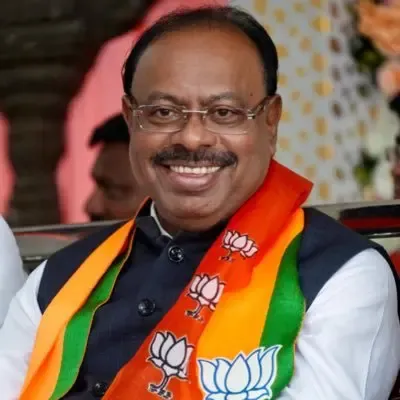Does 64% of GST Come from the Poor and Middle Class While Only 3% Comes from Billionaires?

Synopsis
Key Takeaways
- 64% of GST is derived from the poor and middle class.
- Only 3% of GST comes from billionaires.
- The Corporate Tax rate has decreased from 30% to 22%.
- The Congress party demands a more rational tax regime.
- Essential goods like packaged milk and wheat flour are now taxed.
Bengaluru, Sep 4 (NationPress) Karnataka's Minister for Rural Development and Panchayat Raj (RDPR), IT, and BT, Priyank Kharge, criticized the recent overhaul of the eight-year-old indirect tax framework by the Centre. He highlighted on Thursday that 64% of the overall Goods and Services Tax is sourced from the poor and middle class, while a mere 3% GST is collected from billionaires. He noted that the Corporate Tax rate has been slashed from 30% to 22%.
Minister Kharge added, “Now that the government has finally responded to our calls for rationalizing and simplifying the GST, they still need to determine how they will offset the losses for states like Karnataka.”
He took to the social media platform X, stating, “A glimmer of common sense seems to have reached Prime Minister Narendra Modi’s government regarding the 'Gabbar Singh Tax'. For nearly a decade, the Indian National Congress has been advocating for GST simplification. The concept of 'One Nation, One Tax' has devolved into 'One Nation, 9 Taxes' — including rates of 0%, 5%, 12%, 18%, 28%, and special rates of 0.25%, 1.5%, 3%, and 6%.
Kharge emphasized that both Rahul Gandhi, the Leader of the Opposition in the Lok Sabha, and AICC President Mallikarjun Kharge have consistently advocated for a cap of 18% or lower on GST rates. The Congress party, in its manifestos for both 2019 and 2024, has called for a GST 2.0 featuring a more streamlined and rational tax system. They have also pushed for simplifying the complex compliance requirements that have negatively impacted MSMEs and small businesses.
For the first time, farmers are facing taxation under the BJP, with GST rates on at least 36 goods/items in the agriculture sector ranging from 12% to 28%, he revealed.
Furthermore, essential commodities like packaged milk, wheat flour, curd, books, and stationery have also been subjected to GST, Kharge pointed out.









